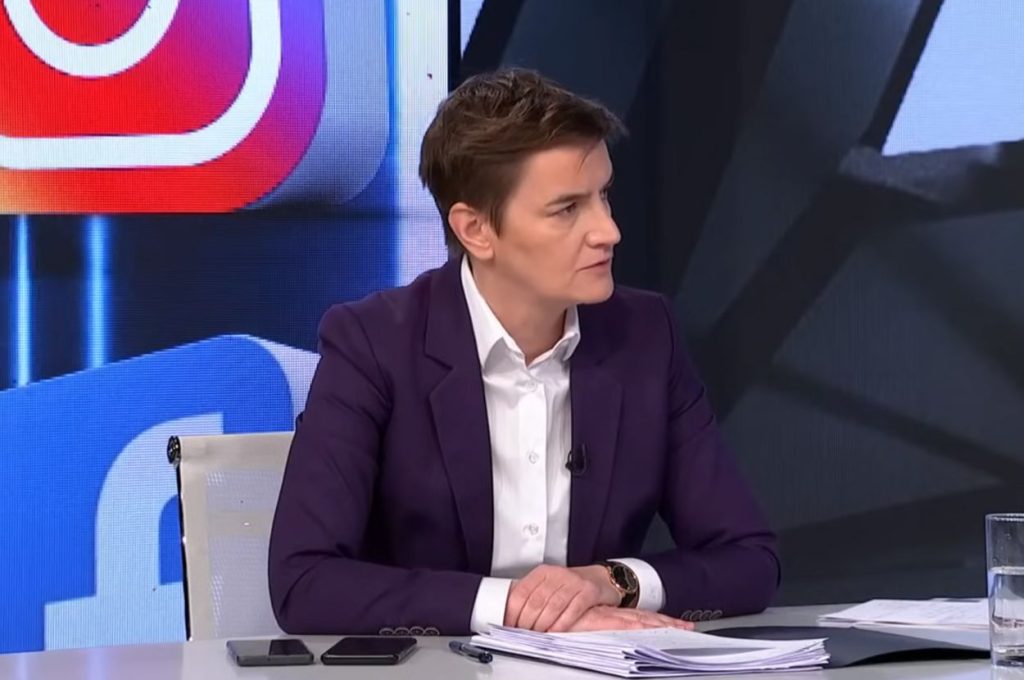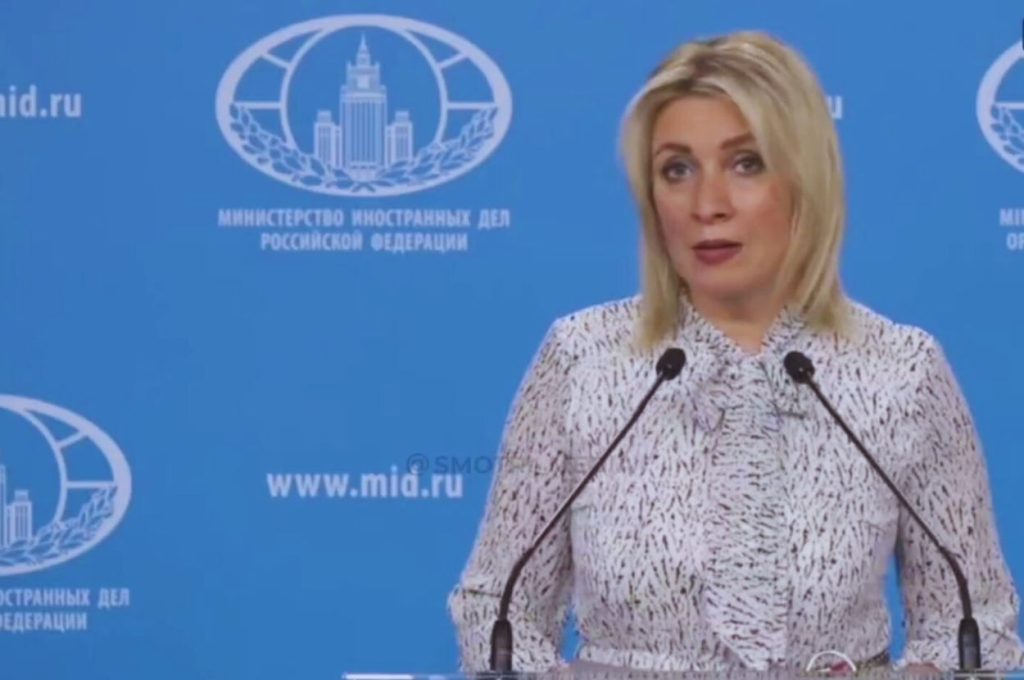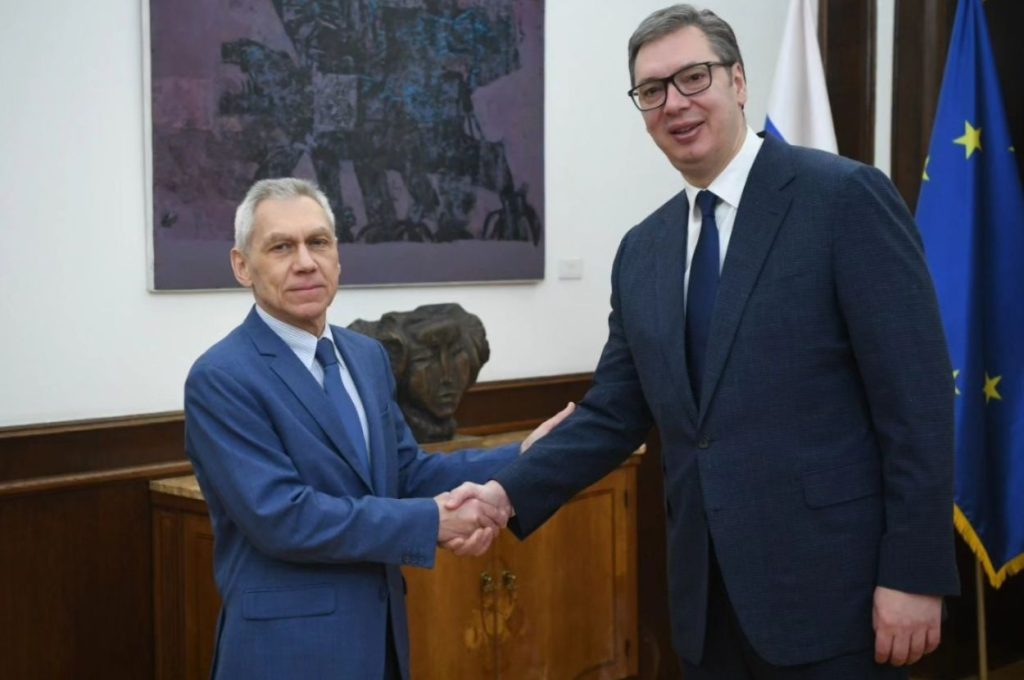Elections in Serbia and Russia’s pat on the back
The Prime Minister expressed gratitude to “people from the Russian service” for the information they “shared” with the Serbian authorities about the protests in Belgrade. After a few hours, the President of Serbia met with the Russian ambassador, and they discussed the “turmoil” in front of the Belgrade City Assembly. The chain continues with statements from Russian officials and media headlines in which Moscow “exposed the plans of the West” for the Serbian version of Maidan. In the end, the fact remains that the state leadership and the media in Serbia used the post-election crisis to portray Russia as a friend and the West as an enemy.
When the German Foreign Minister, Annalena Baerbock, expressed “enormous concern about tendencies of nationalist propaganda” in Serbia ahead of the elections held on 17 December, the response came at lightning speed.
“She is concerned about nationalist tendencies… She probably listened to the speeches of people from the ‘Serbia against Violence’, who suddenly became patriots. Until yesterday, they were saying everything was okay with the German-French plan, and now, all of a sudden, it’s not acceptable, and so on. That’s probably why she’s concerned. Joking aside, she’s not concerned about that. I could say that I’m concerned about every word she utters, but it doesn’t even cross my mind to say that. Simply put, I’m not particularly interested in what she says; I’m interested in what our people say and what the citizens of this country say. That’s the only thing that interests me. Otherwise, if any of us were to talk in such a way, pretending to be concerned about German elections, they would hang us in Berlin, in The Hague, or Brussels. But well, people have already got used to their hypocrisy and double standards. As you can see, I have no problem expressing all this in this way since it will be on her desk in four minutes”, said the President of Serbia, Aleksandar Vučić, appearing on the morning programme of TV Pink just a few days after Baerbock’s statement reached Belgrade.
Apart from the attention of the President, the German minister also attracted media attention, primarily through headlines suggesting that she was “peeking into boxes” and “openly interfering in our electoral process”. After this exchange between Belgrade and Berlin, there was a brief pause until Moscow got involved, although these assessments were not interpreted as an “interference” in the elections neither by the representatives of the Serbian government nor by mainstream media.
Defence of Serbia and thanks to Russia
While opposition leaders and citizens demanding the annulment of elections gathered outside the Republic Electoral Commission and later in front of the Belgrade City Assembly on Sunday, 24 December, the Prime Minister Ana Brnabić, appeared on the TV show ‘Hit Tvit’ on TV Pink.

On one side that evening, there was the opposition wanting to address the gathered crowd from the balcony of the Assembly, while on the other side, the gendarmerie, after several incidents, joined police units in arresting and pushing demonstrators into nearby streets. On the third side there was Brnabić, who from the Pink studio, decided to step up in the “defence of Serbia” and express gratitude to the “people from the Russian service”.
“Well, I can only say thank you, and it probably won’t be popular with those from the West, but I also really feel, especially tonight, that it is important to defend Serbia and to thank the people from the Russian service, who had all this information and shared it with us. And we then shared it with everyone else. And everyone else said, oh well, it’s Russian disinformation, that’s spreading fake news”, stated Ana Brnabić.
Even before the elections were called and throughout the events that followed after 17 December, the Prime Minister was the most vocal in claiming that the goal of opposition leaders was to “destabilise the country” and create “chaos” in Serbia as early as 18 December. Minister of Public Administration and Local Self-Government Aleksandar Martinović joined her, stating through an official ministry announcement that opposition parties were preparing to provoke “chaos, even civil war”.The pro-government media participated in such intimidation campaigns with headlines suggesting that the opposition planned an attack on the Republic Electoral Commission on election night, that they wanted to “seize power by force”, and “set the country on fire”.
The following morning, Serbian President Aleksandar Vučić posted on Instagram that he had informed the Russian Ambassador, Aleksandar Botsan-Kharchenko, about the “riots in Belgrade” and reiterated that they would do “everything to preserve the safety of citizens and our Serbia”.
View this post on Instagram
After the meeting, Botsan-Kharchenko shared his perspective. As reported by the media, he said that Vučić has “undeniable evidence” that the West is behind the riots in Belgrade.
“The opposition initiated the protests, which were externally supported. Vučić talked about this; I can’t go into details because the information is confidential. But he has undeniable evidence that incitement to turmoil came from the West”, stated the Russian diplomat.
Who informed whom that the West was to blame for the protests in Serbia and who should thank whom – the media clarified. Front-page headlines after Vučić’s meeting with the Russian ambassador said that “Moscow exposed the West’s plans for a Maidan in Belgrade” and that “The Russians also pointed to Germany’s tentacles in the Serbian ‘Maidan”.
Serbian and Russian officials about Maidan and handbooks
After the Election Day, amidst citizen dissatisfaction spilling onto the streets even before the official election results, Belgrade and Moscow found common ground on another issue – the planned Maidan in Belgrade.
Prime Minister Brnabić reiterated on 19 December, appearing on TV Pink, that the opposition had done everything during the campaign to “create an atmosphere of panic and chaos”, emphasising also that the new gatherings were an attempt of “Maidan in Belgrade”.
“What they are trying now, it’s Maidan in Belgrade… That’s the attempt to seize power through revolution on the streets. That won’t pass”, highlighted Brnabić.
When officials in Serbia and their supporters talk about Maidan, they often refer to the Orange Revolution and the large demonstrations at the end of 2004 and the beginning of 2005, which resulted in the defeat of the pro-Russian President of Ukraine, Viktor Yanukovych, in the repeat elections.
From the section “Maidan in Serbia”, the media also underpinned a statement made by Maria Zakharova, the spokesperson for the Russian Ministry of Foreign Affairs. She mentioned that “the West has a huge desire for a Maidan to happen in Serbia”, but that “the people of Serbia will resolve everything themselves”.
“All these alleged rallies are not rallies at all, but simply mobilising people onto the streets to achieve goals that are not in line with democratic processes, and to promote Western interests using unconstitutional means that contradict domestic laws. All of this indicates that the West has a huge desire to conduct a Maidan in the Balkans, and the best illustration of where this leads is to look at the example of Ukraine, as a model of what the people and the state should not do”, domestic portals reported Maria Zakharova’s words.
Zakharova had more to say in the following days. She continued to comment on the protests in Serbia, once again noting that she clearly sees the handwriting of the West in them.
“A week after the Republic of Serbia’s extraordinary parliamentary elections, under the pretext of alleged fraud, attempts were made to ‘Maidanise’ street protests in Belgrade”, Zakharova said, adding:
“They used familiar patterns from Western handbooks that have been used several times in numerous countries, with inevitably tragic results”.

If someone was not clear about the handbooks Zakharova referred to, the President of Serbia was there to explain. After the announcement of the results of the “Serbia Must Not Stop” list from the polling stations where the Belgrade and parliamentary elections were repeated, he also mentioned manuals, specifically in the context of “the colour revolutions” and non-governmental organisations “pretending neutrality”.
“It is not a problem if a non-governmental organisation that unsuccessfully pretends neutrality provides you with fluorescent vests for protesters, supposedly students. It is not a problem to provide backpacks, it is not a problem to supply a double-wing tent, it is all in the handbooks of ‘the colour revolutions’. It is not a problem to supply whistles, it is not a problem to provide you with water in special bottles, it is not a problem to teach you what to say to the police when caught committing violence, it is not a problem to know which lawyer to call and what to do. All of that is in the manuals. But there is one problem, what have you forgotten, and why is there nothing of any revolution… To conduct a revolution, that’s not enough. It is not technique and it is not mathematics – it is politics. Politics is essence, politics is life, politics is legitimacy. You can not seize power by force with such a small percentage of support because then you get even more odium and face even greater resistance from ordinary people. And today’s results are the resistance of ordinary people against the destruction of their country”, said Vučić.
From the East, therefore, came everything that suited the ears of representatives of the government in Serbia. Aside from Putin’s New Year’s greetings to selected figures like Hungarian Prime Minister Orban and Serbian President Vučić, Belgrade also received the opinion of Russian Foreign Minister Sergey Lavrov, stating that there was an “attempt to stage an illegal takeover of power” in the Serbian capital, but that “the country’s leadership firmly holds the situation under control, clearly understanding that it is now a matter of national interest”.
“It is evident that not everyone in the West is ready to accept that Serbian voters expressed support for President Aleksandar Vučić and his political course in the elections”, said Lavrov.
The Serbian-Russian harmony suggests that the West will have to make more effort to avoid being attributed with “hypocrisy”, as President Serbia referred to comments made by Annalena Baerbock, or to avoid being accused of “lies”, “maltreatment” and “direct destabilisation of Serbia”, as the Prime Minister assessed the findings of election observers from Europe.

